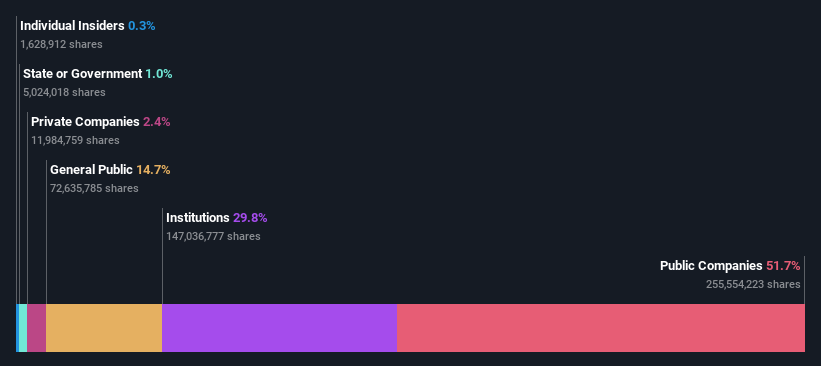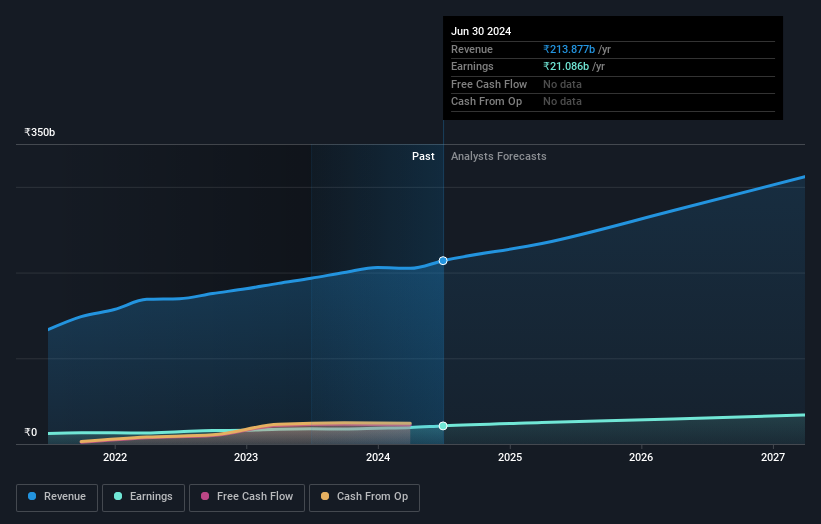ICICI Lombard General Insurance Company Limited (NSE:ICICIGI) most popular amongst public companies who own 52% of the shares, institutions hold 30%

Key Insights
- ICICI Lombard General Insurance's significant public companies ownership suggests that the key decisions are influenced by shareholders from the larger public
- The largest shareholder of the company is ICICI Bank Limited with a 52% stake
- Institutions own 30% of ICICI Lombard General Insurance
If you want to know who really controls ICICI Lombard General Insurance Company Limited (NSE:ICICIGI), then you'll have to look at the makeup of its share registry. And the group that holds the biggest piece of the pie are public companies with 52% ownership. In other words, the group stands to gain the most (or lose the most) from their investment into the company.
And institutions on the other hand have a 30% ownership in the company. Insiders often own a large chunk of younger, smaller, companies while huge companies tend to have institutions as shareholders.
Let's take a closer look to see what the different types of shareholders can tell us about ICICI Lombard General Insurance.
Check out our latest analysis for ICICI Lombard General Insurance

What Does The Institutional Ownership Tell Us About ICICI Lombard General Insurance?
Institutional investors commonly compare their own returns to the returns of a commonly followed index. So they generally do consider buying larger companies that are included in the relevant benchmark index.
As you can see, institutional investors have a fair amount of stake in ICICI Lombard General Insurance. This can indicate that the company has a certain degree of credibility in the investment community. However, it is best to be wary of relying on the supposed validation that comes with institutional investors. They too, get it wrong sometimes. When multiple institutions own a stock, there's always a risk that they are in a 'crowded trade'. When such a trade goes wrong, multiple parties may compete to sell stock fast. This risk is higher in a company without a history of growth. You can see ICICI Lombard General Insurance's historic earnings and revenue below, but keep in mind there's always more to the story.

Hedge funds don't have many shares in ICICI Lombard General Insurance. Looking at our data, we can see that the largest shareholder is ICICI Bank Limited with 52% of shares outstanding. With such a huge stake in the ownership, we infer that they have significant control of the future of the company. SBI Funds Management Limited is the second largest shareholder owning 4.2% of common stock, and ICICI Prudential Asset Management Company Limited holds about 2.9% of the company stock.
While it makes sense to study institutional ownership data for a company, it also makes sense to study analyst sentiments to know which way the wind is blowing. There are plenty of analysts covering the stock, so it might be worth seeing what they are forecasting, too.
Insider Ownership Of ICICI Lombard General Insurance
While the precise definition of an insider can be subjective, almost everyone considers board members to be insiders. Company management run the business, but the CEO will answer to the board, even if he or she is a member of it.
I generally consider insider ownership to be a good thing. However, on some occasions it makes it more difficult for other shareholders to hold the board accountable for decisions.
Our information suggests that ICICI Lombard General Insurance Company Limited insiders own under 1% of the company. However, it's possible that insiders might have an indirect interest through a more complex structure. It is a very large company, so it would be surprising to see insiders own a large proportion of the company. Though their holding amounts to less than 1%, we can see that board members collectively own ₹3.2b worth of shares (at current prices). In this sort of situation, it can be more interesting to see if those insiders have been buying or selling.
General Public Ownership
With a 15% ownership, the general public, mostly comprising of individual investors, have some degree of sway over ICICI Lombard General Insurance. This size of ownership, while considerable, may not be enough to change company policy if the decision is not in sync with other large shareholders.
Public Company Ownership
Public companies currently own 52% of ICICI Lombard General Insurance stock. This may be a strategic interest and the two companies may have related business interests. It could be that they have de-merged. This holding is probably worth investigating further.
Next Steps:
It's always worth thinking about the different groups who own shares in a company. But to understand ICICI Lombard General Insurance better, we need to consider many other factors. Be aware that ICICI Lombard General Insurance is showing 1 warning sign in our investment analysis , you should know about...
But ultimately it is the future, not the past, that will determine how well the owners of this business will do. Therefore we think it advisable to take a look at this free report showing whether analysts are predicting a brighter future.
NB: Figures in this article are calculated using data from the last twelve months, which refer to the 12-month period ending on the last date of the month the financial statement is dated. This may not be consistent with full year annual report figures.
New: AI Stock Screener & Alerts
Our new AI Stock Screener scans the market every day to uncover opportunities.
• Dividend Powerhouses (3%+ Yield)
• Undervalued Small Caps with Insider Buying
• High growth Tech and AI Companies
Or build your own from over 50 metrics.
Have feedback on this article? Concerned about the content? Get in touch with us directly. Alternatively, email editorial-team (at) simplywallst.com.
This article by Simply Wall St is general in nature. We provide commentary based on historical data and analyst forecasts only using an unbiased methodology and our articles are not intended to be financial advice. It does not constitute a recommendation to buy or sell any stock, and does not take account of your objectives, or your financial situation. We aim to bring you long-term focused analysis driven by fundamental data. Note that our analysis may not factor in the latest price-sensitive company announcements or qualitative material. Simply Wall St has no position in any stocks mentioned.
About NSEI:ICICIGI
ICICI Lombard General Insurance
Provides various general insurance products and services in India.
Solid track record with excellent balance sheet.
Market Insights
Community Narratives




